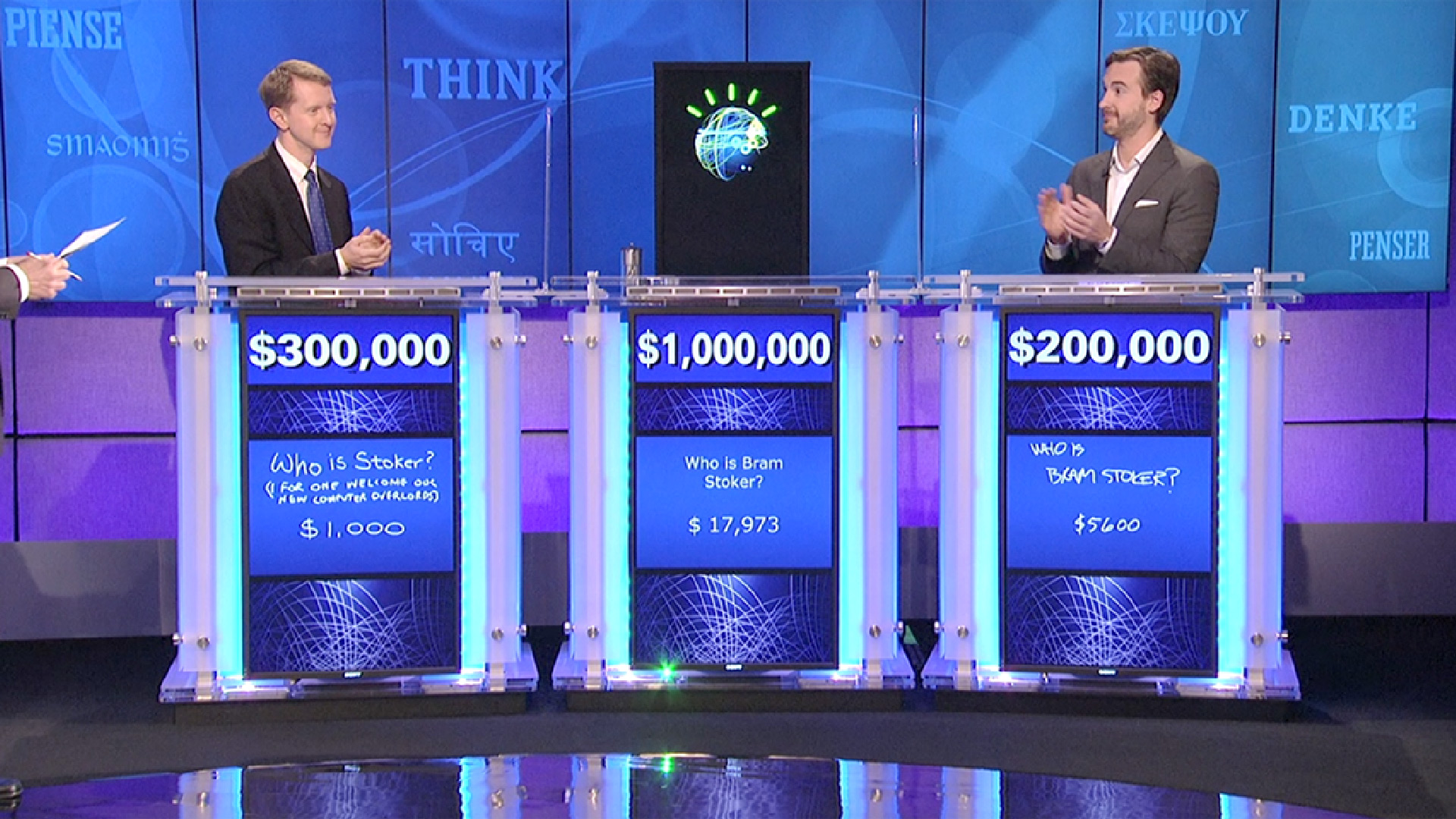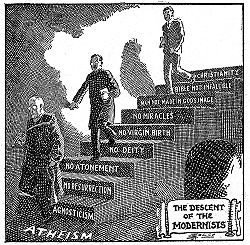 |
| http://watson2016.com/_images/watson_on_jeopardy.jpg |
Modern western society is founded upon the products of the Age of Enlightenment and the Scientific Revolution. Values from religious tradition have had an influence on modern society, but science has allowed society to transition to more secular principles and philosophies. Friedrich Nietzsche in his book, The Gay Science, famously said, "God is dead. God remains dead. And we have killed him.", meaning he felt that religious ideals were no longer a credible source of moral judgment. A void was created by secular ideas which allowed man to dethrone it's creator and become the apex of existence. Our modern values are based on this humanist philosophy. Current ethical and philosophical views are dependent on the intrinsic value and agency of human beings.

https://upload.wikimedia.org/wikipedia/commons/thumb/1/10/Descent_of_the_Modernists,_E._J._Pace,_Christian_Cartoons,_1922.jpg/250px-Descent_of_the_Modernists,_E._J._Pace,_Christian_Cartoons,_1922.jpg
https://s-media-cache-ak0.pinimg.com/originals/35/cf/9a/35cf9a125205a2d57ce0a9694b65aa87.jpg
Post-humanist ideas are in direct conflict with the foundations of modern society because post-humanism rejects the uniqueness and sanctity of humanity. The post-humanist rejects the humanist's claim on man's nature specifically that human's are autonomous, rational and capable of freewill. What would happen if this assumption is proven false, in other words, what would happen if humans are not free agents? Neuroscientist, Sam Harris, makes a strong argument against the existence of freewill, and he himself acknowledges the dangerous implications of such idea. The argument entails a deterministic view of reality where everything from your genetic code to the events in your early childhood influences every decision you make, even those which appear to be free. According to Harris, all decisions are based on processes in the brain and a person's decision could be predicted by analyzing their brain's activity.
If we are all prone to certain behavior patterns based on circumstances completely outside of our control, are we really responsible for our actions? Is a violent criminal responsible for his actions? Are we any different from an animal acting on instinct, or worse, are we any different from a machine running a program? If we are capable of programming machines with intelligence on par with our own, it would imply that our own intelligence functions in a similar way or that our intelligence is not as special as we believe. Without the idea of freewill, concepts like justice and fairness hold no value. Social contracts will not be valid as they are dependent on the free-choice of individuals. The foundations of our society would be ripped out completely.
 Post-humanism's monstrous idea is not of artificial intelligence taking over the world, but the possibility that we are deterministic machines ourselves. Maybe our freewill is an illusion and, in reality, we have no control over our lives. Maybe we are not special, and an intelligence greater than ours is on the horizon. Maybe humanist ideals are no longer a credible source of moral judgment.
Post-humanism's monstrous idea is not of artificial intelligence taking over the world, but the possibility that we are deterministic machines ourselves. Maybe our freewill is an illusion and, in reality, we have no control over our lives. Maybe we are not special, and an intelligence greater than ours is on the horizon. Maybe humanist ideals are no longer a credible source of moral judgment."How shall we comfort ourselves, the murderers of all murderers?" — Nietzsche, The Gay Science
http://www.troll.me/images/conspiracy-keanu/
what-if-im-the-only-human-and-everyone-else-are-just-robots-thumb.jpg

It makes sense that our genetic code, our environment, our everything is predetermined somehow. Clearly there are outside factors that influence our actions and decisions every day. I mean, did I decide to comment on your post because I wanted to comment, is it because I have to comment and yours was the first one that caught my eye, who knows.
ReplyDeleteCorrect me if I am wrong, but could I assume that you are stating that our experiences, actions and everything is sort of an illusion? Since there is no free will, and since there is no “essence” of what we call a self, then we are just an object inside of a larger, infinite system, whose purpose is to do whatever we are predetermined to do? Therefore, there is no Karen, just an illusion of “Karen”. So there is also no such being as Rafael, just an illusion of Rafael, and this blog post is an illusion of your thoughts. This “Rafael” going to school and learning something like the fundamental theorems of calculus is an illusion. And so, Sir Isaac Newton’s and Gottfried Leibniz’s creation of calculus is an illusion. And Sir Isaac Newton and Gottfried Leibniz are also an illusion. In other words, every human is not unique, nothing really matters and everything is irrelevant and insignificant.
I do not agree with that. Experiences are crucial to the world of technology and science. How would have someone thought of the idea of the law of thermodynamics, the speed of light, the theory of relativity, the fundamental theorems of calculus without the experiences and observations? Those experiences and observations are by all means significant, crucial even. They are imperative to the world, they are unique experiences that sparked a unique thought, they sparked unique curiosity and sparked years and years of hard work and experimentation. Therefore, those scientists, innovators, mathematicians and others are unique and special. Perhaps they were predetermined to think that way and to make such discoveries and observations. Maybe their environment and their genetic code were the reason they created whatever they created. Their intelligence and discoveries are unique and so very real. Since your blog is based on science, you have to believe that science is real and not an illusion. Therefore, they are important to science. So to call them equals to the rest of the humanity is just plain wrong. If they are objects of the infinite system, they serve a greater purpose to the system than someone like myself do. I may just be a reference to a minuscule variable of a program, while they are the whole separate system.
Rafael, I think that you raise an interesting point regarding the fact that freewill, as humanity understands, might not exist. In itself, that notion is scary because all of human society, social contracts, and government rely on the prospect that people are responsible for their actions. Human-run society could possibly collapse under this ideology because no accountability could be enforced on individuals, creating unknown chaos. Along with that idea, though, humanity might lose the current understanding of what it means to be human. The more that I think about this topic, the more that I believe that freewill is a flawed concept. Humans certainly are products of their environment and surroundings. However, it seems that there are more outside factors both influencing and determining our actions than ever before with the expansive capabilities of information from the internet. The more knowledge, information, and experiences that are computed into our being will only continue to impact the decisions and actions that are undertaken by individuals well into the future.
ReplyDeleteHey Rafael,
ReplyDeleteYour argument that “we are deterministic machines ourselves” and have no control over our lives is more realistic than it sounds, and honestly doesn't necessarily have anything to do with the advance of technology or robots. Think about this: are we really in control of our lives? We like to say that we have free will, but we talked about in class that the people who came up with these “free will” theories were well-off enough to have time to sit around and think about these things. In reality, we are all products of society. Sure, you COULD sit around and do nothing but think all day, but you would not have money for a house, food, or clothing. Each of us has to make a living and work. We, as students, don’t HAVE to do our homework, and don’t even HAVE to be college students… But if we want a well-paying job, then yes, we have to. No matter how you look at it, I feel like people are deterministic machines. We do what we are told to do so we can live a comfortable lifestyle. If people defied the norm more often, society wouldn’t function the way it does today.
Under this argument, you asked what separated us from wild animals, if we had no "free will." After mulling that over for some time, I came to the conclusion that what separates us from wild animals - and even some wild animals from others - is sapience. While we might not have "free will" as we idealize it, we are self-aware, or at least aware enough to raise the question of true "free will" in the first place. We have a form of error-checking, as it were. For example: In the case of a social contract, we can acknowledge that we are being presented a contract, mull over the terms, and either accept or deny said terms. In my opinion, the fact that we know what a contract is, and understand the connotations of such a thing is what truly separates from sort of instinctual machine.
ReplyDeleteA program does not acknowledge and understand, it only receives an input, runs a computation, and outputs a result. There is no innate or learned understanding of what it is computing, or why it is doing so. Certainly, I imagine we will one day reach a point where we have "programs" of doing so, but I think at that point they stop being "just machines."